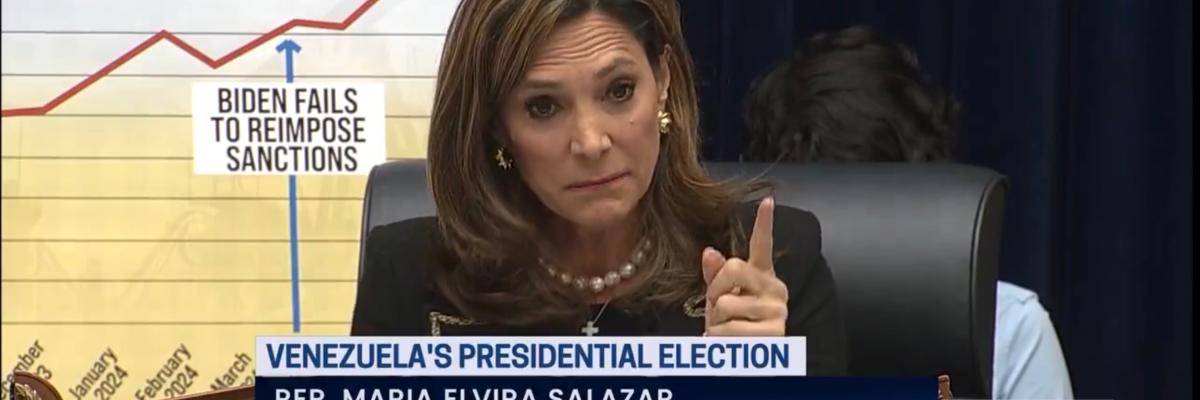Salazar Condemns Biden Administration for Allowing Oil Companies to Finance Maduro Regime

WASHINGTON, D.C. – Today, Western Hemisphere Subcommittee Chairwoman María Elvira Salazar (R-FL) convened a hearing to condemn American and European oil companies for continuing to conduct business with the Maduro regime, even after its attempt to steal the 2024 presidential election.
“In Venezuela, a cruel contradiction has unfolded. Maduro has intensified his brutality through jail and death since July 28th,” said Chairwoman Salazar. “In the meantime, unfortunately, American and European oil companies led by Chevron, Repsol, Eni, and Maurel et Prom have now increased their pumping and their profits—directly fueling the tyrannical machinery of oppression. Shame on them!”
Chairwoman Salazar began her hearing by describing the current human rights situation in Venezuela, where the dictator Nicolas Maduro has unleashed an unprecedented wave of repression against the opposition and regular civilians in the weeks following the 2024 Venezuelan presidential election. She identified a key weakness in the Biden-Harris Administration’s policy towards the Maduro regime: Allowing American oil companies to continue operating in Venezuela without complaint. Chevron, Repsol, Eni, and Maurel et Prom are the four companies with the largest licenses to operate within Venezuela.
Salazar began her line of questioning by asking the top Biden-Harris State Department official on Venezuela Kevin Sullivan why his agency renewed Chevron’s license to operate in Venezuela 33 days after Maduro lost the election on July 28, 2024. Sullivan insisted that the decision comes down ultimately to the Treasury Department’s Office of Foreign Assets Control (OFAC). Salazar reminded Sullivan that OFAC only issues policy at the direction of the State Department, so any independence in their decision-making process is simply wrong. Chairwoman Salazar also indicated that by allowing these companies to continue operating in Venezuela, the Maduro regime will retain the financial support it needs to continue its repression against the Venezuelan people.
Next, Chairwoman Salazar asked Mr. Sullivan about the 50 companies who applied for licenses to operate in Venezuela more broadly. After deflecting and referring the Congresswoman to OFAC again, Salazar made the case that by allowing these companies to operate in Venezuela without repercussions from the U.S. government, the United States is sending a weak and ambiguous message to the international community that what Maduro is doing is ultimately acceptable. Furthermore, Chairwoman Salazar asked about the possibility that the State Department will pause these licenses. Sullivan responded that the possibility is always there as a matter of policy, but again said it was still under review.
Chairwoman Salazar continued her opening line of questioning by asking about the Biden-Harris Administration’s refusal to recognize Edmundo Gonzalez Urrutia as the legitimate president-elect of Venezuela. Sullivan responded that Gonzalez is definitely the victor in the Venezuelan elections, and that the U.S. government has called on Nicolas Maduro to release the results showing these results. Salazar reminded the State Department that anything short of recognition will be seen as a lack of support for the opposition in the eyes of the Maduro regime.
Salazar closed her opening remarks by asking the leading officials on human rights and aid at the State Department and USAID, Mr. Enrique Roig and Mr. Greg Howell, respectively, about the impact this major policy weakness will have on migratory flows. 4 million Venezuelans said they would leave their country if the dictator Maduro refuses to hand over power. This will strain resources in neighboring South American countries like Colombia, Brazil, and Ecuador, and add to the growing national security crisis at the United States’ southern border. Salazar received no response other than that the U.S. government is working with those South American governments to strengthen their capacity to receive these migrants.
Chairwoman Salazar ended the hearing by emphasizing the need for bipartisan support for the Venezuelan opposition at this crucial hour.
To watch the full hearing, click here.
###